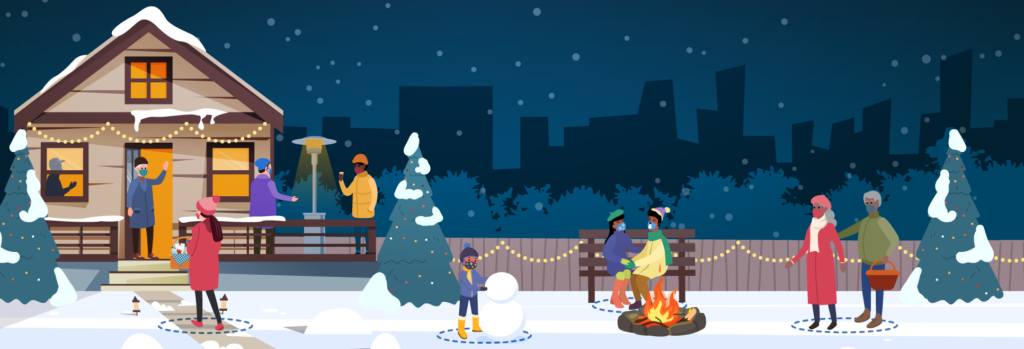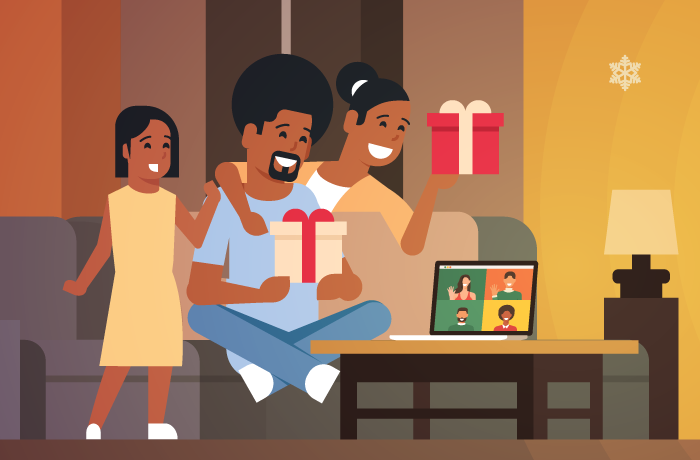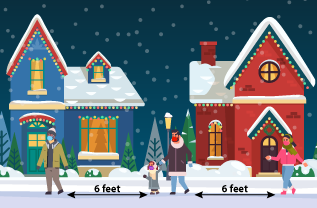Holiday Hours & CDC Guidelines
Dic 22, 2020
This week there are special holiday hours for the clinic and pharmacy we want to make sure you are aware of. If you require after-hours immediate care when we are closed, call (316) 262-6262. If you think you have a medical emergency, call 911 or your doctor immediately.
Thursday, December 24
- Clinic – CLOSED
- Pharmacy – CLOSED
Friday, December 25
- Clinic – CLOSED
- Pharmacy – CLOSED
Saturday, December 26
- Clinic – CLOSED
- Pharmacy: 9am – 1pm
Friday, January 1
- Clinic – CLOSED
- Pharmacy – CLOSED

CDC Holiday Guidelines
The safest way to celebrate winter holidays is at home with the people who live with you. Travel and gatherings with family and friends who do not live with you can increase your chances of getting or spreading COVID-19 or the flu.
The following CDC recommendations are from https://www.cdc.gov/coronavirus/2019-ncov/daily-life-coping/holidays/winter.html
Wear a mask
- Wear a mask with two or more layers to stop the spread of COVID-19 to protect others and yourself.
- Wear your mask over your nose and mouth, secure it under your chin, and make sure it fits snugly against the sides of your face.
- Wear a mask indoors and outdoors.
- In cold weather, wear your mask under your scarf, ski mask, or balaclava.
- Keep a spare mask in case your mask becomes wet from moisture in your breath or from snow or rain.
Stay at least 6 feet away from others who do not live with you
- Indoors or outdoors, you are more likely to get or spread COVID-19 when you are in close contact with others for a total of 15 minutes or more over a 24-hour period.
- Remember that people without symptoms or with a recent negative test result can still spread COVID-19 to others.
Avoid crowded, poorly ventilated indoor spaces
- As much as possible, avoid crowds and indoors spaces that do not offer fresh air from the outdoors. If indoors, bring in fresh air by opening windows and doors, if possible.
Wash your hands
- Wash hands often with soap and water for at least 20 seconds, especially after you have been in a public place, after blowing your nose, coughing, or sneezing and before eating.
- Make sure to dry your hands completely using a clean towel or by air drying.
- If soap and water are not readily available, use a hand sanitizer that contains at least 60% alcohol.
- Avoid touching your mask, eyes, nose, and mouth.
Get a flu shot as soon as possible
- The flu shot can help protect you and your family, friends, and community from getting and spreading flu.
- By getting a flu shot, you can also help lower hospital visits and serious health problems from flu.
Safer Celebrations
Celebrating virtually or with the people you live with is the safest choice this winter. If you do gather with people who don’t live with you, gatherings and activities held outdoors are safer than indoor gatherings.
Attending a Winter Holiday Celebration
In addition to following the steps that everyone can take to make the holidays safer, take these additional steps if attending a gathering to make your celebration safer:
- Have conversations with the host ahead of time to understand expectations for celebrating together.
- Bring your own food, drinks, plates, cups, utensils, and condiment packets.
- Wear a mask indoors and outdoors.
- Avoid shouting or singing.
- Stay home if you are sick or have been near someone who thinks they may have or have been exposed to COVID-19.
- It’s okay if you decide to stay home and remain apart from others. Do what’s best for you.
Hosting a Winter Holiday Celebration
If you choose to have guests at your home, make sure that everyone follows the steps to make holiday celebrations safer. Other ways you can make your celebration safer include:
- Have conversations with guests ahead of time to set expectations for celebrating together.
- Limit the number of guests.
- Have a small, outdoor celebration with family and friends who live in your community, weather-permitting.
- Have extra unused masks available for your guests and encourage everyone to wear them inside and outside.
- Clean and disinfect frequently touched surfaces and items between use.
- If celebrating indoors, bring in fresh air by opening windows and doors, if possible. You can use a window fan in one of the open windows to blow air out of the window. This will pull fresh air in through the other open windows.
- Have a separate space for guests to wash their hands or provide hand sanitizer.
- Keep background music volume low so guests don’t need to shout.
- Cancel your gathering if you or someone who lives with you is sick or has been near someone who thinks they have or has COVID-19.
- It’s okay if you decide to postpone or cancel your gathering. Do what’s best for you.
Food and Drink at Holiday Celebrations
When it comes to winter holidays, food traditions are often an important part of celebrations. There is no evidence that handling or eating food spreads COVID-19, but it is always important to follow food safety practices. Also make sure to:
- Bring your own food, drinks, plates, cups, and utensils.
- Avoid going in and out of the areas where food is being prepared or handled, such as in the kitchen.
- Use single-use options, like salad dressing and condiment packets, and disposable items like food containers, plates, and utensils.
- Use a touchless garbage can, if available.

Consider Other Winter Holiday Activities
The safest way to celebrate winter holidays is at home with the people you live with. Here are some ideas for celebrating the winter holidays safely.
Host a virtual celebration with friends and family
- Schedule a time to eat a meal together virtually and have people show their main dish, vegetable, or dessert.
- Host a virtual “ugly” holiday sweater contest.
Gather virtually for a gift exchange or activity
- Schedule a time to meet virtually to open gifts together.
- Build gingerbread houses, decorate cookies, or make holiday crafts and decorations.
Decorate for the season
- Decorate or create a winter holiday scene and take family photos at home.
- Drive or walk around your community to look at decorations from a safe distance or drive through a local holiday light display.
- Make holiday crafts, cards, or cookies to send or deliver to family, friends, and neighbors in a way that does not involve contact with others, such as leaving them at the door.
Throw a virtual dance party
- For winter holidays that traditionally include music and dance, set aside time with loved ones to meet online to share music and dance.
- Collaborate with friends and family on a holiday playlist.
Enjoy the winter weather, if you live somewhere with snow
- Hold a snowman or snow angel contest with neighbors or friends in your community.
- Build a snow fort or other snow structure.
Volunteer to help others in need
- Reach out to your local community service organizations to get involved and give back. Make sure to ask about their safety precautions in advance.
- Find virtual opportunities to contribute.
Attend a virtual religious ceremony
- Visit the communities of faith webpage for information on how best to practice their beliefs while keeping their staff and congregations safe.
- Attending virtual services is the safest way to worship.
If your holiday traditions usually involve visiting Santa Claus, check local opportunities and know requirements for visiting safely.
- Schedule a virtual visit to the North Pole.
- Visit Santa Claus outside while a wearing mask and staying 6 feet apart.
- If Santa Claus is staying indoors, he will likely be taking safety measures; you may be able to visit him through a plexiglass safety window.

Holiday Travel
Travel may increase your chance of spreading and getting COVID-19. CDC continues to recommend postponing travel and staying home, as this is the best way to protect yourself and others this year.
If you are considering traveling for the winter holidays, here are some important questions to ask yourself and your loved ones beforehand. These questions can help you decide what is best for you and your family.
- Are you, someone in your household, or someone you will be visiting at increased risk for getting very sick from COVID-19?
- Are cases high or increasing in your community or at your destination? The more cases in your community or at your destination, the more likely you are to get and spread COVID-19 as a result of your door-to-door travel. Check CDC’s COVID Data Tracker for the latest number of cases in each area.
- Are hospitals in your community or at your destination overwhelmed with patients who have COVID-19? To find out, check state and local public health department websites.
- Does your home or destination have requirements or restrictions for travelers? Check state and local requirements before you travel.
- During the 14 days before your travel, have you or those you are visiting had close contact with people they don’t live with?
- Do your plans include traveling by bus, train, or airplane, which might make staying 6 feet apart difficult?
- Are you traveling with people who don’t live with you?
If the answer to any of these questions is “yes,” you should consider making other plans, such as hosting a virtual gathering or delaying your travel.
If your answers are “no” and you do decide to travel, be sure to take these steps during your trip to protect yourself and others from COVID-19:
- Check travel restrictions before you go.
- Check CDC’s Domestic Travel Guidance and consider testing before and after you travel.
- Get your flu shot before you travel.
- Always wear a mask in public settings, when using public transportation, and when around people who you don’t live with.
- Wear your mask correctly over your nose and mouth, secure it under your chin, and make sure it fits snugly against the sides of your face.
- Stay at least 6 feet apart from anyone who does not live with you.
- Wash your hands often or use hand sanitizer with at least 60% alcohol.
- Avoid touching your mask, eyes, nose, and mouth.
- Bring extra supplies, such as masks and hand sanitizer.
- If driving, pack your food and limit stops.
- Know when to delay your travel.
